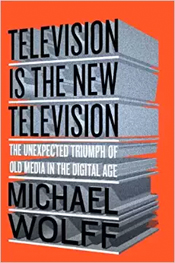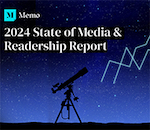The future of media belongs to lean digital-savvy organizations able to navigate the social world, according to conventional pundit wisdom. Unless they junk antiquated business models and adapt to the brave new world, traditional media are fated to go the way of the dodo bird, they intone.
 Nonsense, replies acerbic media critic Michael Wolff in his provocative new book, "Television is the New Television: The Unexpected Triumph of Old Media in the Digital Landscape," published this month by Random House.
Nonsense, replies acerbic media critic Michael Wolff in his provocative new book, "Television is the New Television: The Unexpected Triumph of Old Media in the Digital Landscape," published this month by Random House.
Wolff dismisses the digital model used by Google, Facebook, Yahoo, Buzzfeed, Huffington Post et al. as nothing more than a race to the bottom.
He writes: "Facebook's value as a technology company may seem high, but its actual value comes from the enormity of its meaningless, undifferentiated traffic. It has no other product it can sell than some ads next to complaints about neighbor's dogs, party pics and humblebrags."
To Wolff, the core problem facing digital media is the lack of meaningful subscription revenue (e.g., think cable TV fees). They are forced to follow a "classic schlock model" tied to "advertising prices on the basis of its measurable response and immediate sales performance, which means low per-user revenues and cheap content that converges into advertising (e.g, BuzzFeed's native content.)"
Television also produces low-brow programming, but that output is offset by more selective fare. Wolff says CBS earned its "Tiffany Network" reputation for its impressive news programming, while producing junk shows such as "Beverly Hillbillies" and "Hogan's Heroes." (I was fan of both).
Wolff dismantles the fallacy that Netflix has disrupted the TV business. To him, that position "is a striking inversion of what's actually happening: TV is disrupting the Internet."
Netflix launched as a commerce company delivering videos, which was no more a media business than Blockbuster, notes Wolff. Today, Netflix is using "TV programming, values and behavior—like passive viewing—to heretofore interactive and computing-related screens.
Voila, Netflix has entered the world of HBO and premium paid TV content. Meanwhile, Hollywood studios and TV program suppliers receive hefty license fees from Netflix.
Wolff writes that commodity aspects of the digital world has preventing it making a news product that's a unique experience. Despite the pundit hype, only a handful of digital players generate more than $100M in yearly revenues. Many that do, such as the New York Times began as a traditional news company. Meanwhile, Fox makes $1B a year and the maligned CNN generates about half that amount. Both enjoy margins in excess of 20 percent.
Ignore the geniuses that forecast the death of TV. The medium remains the killer content.


 Trump Media & Technology Group today reported a $58.2M net loss on $4.1M in 2023 revenues, a disclosure that drove its stock price down 22.6 percent to $47.96.
Trump Media & Technology Group today reported a $58.2M net loss on $4.1M in 2023 revenues, a disclosure that drove its stock price down 22.6 percent to $47.96. Barry Pollack, an attorney at Wall Street’s Harris St. Laurent & Wechsler, has registered Julian Assange as a client with the Justice Dept. “out of an abundance of caution.”
Barry Pollack, an attorney at Wall Street’s Harris St. Laurent & Wechsler, has registered Julian Assange as a client with the Justice Dept. “out of an abundance of caution.” Paramount Global to slash 800 jobs in what chief executive Bob Bakish calls part of an effort to “return the company to earnings growth"... Rolling Stone editor-in-chief Noah Shachtman is exiting at the end of the month due to disagreements with chief executive Gus Wenner over the direction the magazine is taking... The New York Times broke the $1 billion barrier in annual revenue from digital subscriptions in 2023... Press Forward is investing more than $500 million to strengthen local newsrooms.
Paramount Global to slash 800 jobs in what chief executive Bob Bakish calls part of an effort to “return the company to earnings growth"... Rolling Stone editor-in-chief Noah Shachtman is exiting at the end of the month due to disagreements with chief executive Gus Wenner over the direction the magazine is taking... The New York Times broke the $1 billion barrier in annual revenue from digital subscriptions in 2023... Press Forward is investing more than $500 million to strengthen local newsrooms. The majority of news articles are read within the first three days of publication, according to a recent report.
The majority of news articles are read within the first three days of publication, according to a recent report. The Los Angeles Times gives pink slips to 115 people or 20 percent of its newsroom staff... TIME is also laying off about 30 employees, which is approximately 15 percent of its editorial staff... The Baltimore Banner, which was launched by Stewart Bainum in 2022 after he failed to buy the Baltimore Sun, added 500 subscribers per day in the three days following Sinclair Broadcast Group's deal to purchase the Sun.
The Los Angeles Times gives pink slips to 115 people or 20 percent of its newsroom staff... TIME is also laying off about 30 employees, which is approximately 15 percent of its editorial staff... The Baltimore Banner, which was launched by Stewart Bainum in 2022 after he failed to buy the Baltimore Sun, added 500 subscribers per day in the three days following Sinclair Broadcast Group's deal to purchase the Sun.


 Have a comment? Send it to
Have a comment? Send it to 
No comments have been submitted for this story yet.